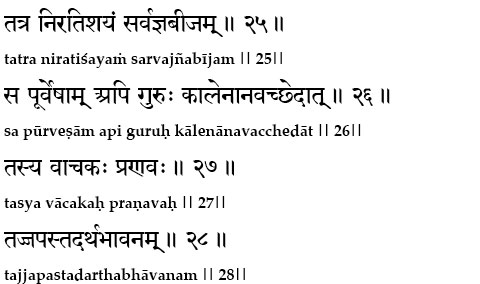

 CLICK TO VIEW ARTICLE (right-click to download to your own hard drive)
CLICK TO VIEW ARTICLE (right-click to download to your own hard drive)
Patanjali’s Yoga-sutra 1.23-28 presents Ishvara (God, the highest Self) as an object of meditation and suggests that he may be contemplated through the sacred syllable OM. Various commentators have provided elaborate analysis and elucidation upon the role of Ishvara within the practice of Yoga. In the following excerpt from his forthcoming book, a translation and extensive commentary on Patanjali’s Yoga-sutras (see publication information below), Dr. Edwin Bryant examines the classical commentaries on this section of text while providing his own insights.
Edwin Bryant is a professor of religious studies at Rutgers University, specializing in Hinduism. He is also a longtime practitioner and scholar of yoga and various forms of bhakti, and conducts workshops at yoga centers throughout America. I was fortunate to be a student of Edwin’s during my time at Rutgers, and I feel still more fortunate to count him as a friend. He has always struck me as a model of frank, objective scholarship mixed with sympathetic involvement and care for the subjects of his inquiry. We are grateful that he has been kind enough to share parts of his study of the Yoga-shastras with us.
To view the article, follow the link above.
-MD
Dr. Bryant’s bio-data:
Edwin F. Bryant received his Ph.D in Indic languages and Cultures from Columbia University. He taught Hinduism at Harvard University for three years, and is presently the professor of Hinduism at Rutgers University where he teaches courses on Hindu philosophy and religion. He has received numerous awards and fellowships, published six books and authored a number of articles on Vedic history, yoga, and the Krishna tradition. In addition to his academic work for the scholarly community, Edwin’s Penguin World Classics translation of the Srimad Bhagavata Purana, the traditional source for the story of Krishna’s incarnation, is both for Indology specialists as well as students and those interested in Hinduism from the general reading public and the yoga community.
As a personal practitioner of yoga for 28 years, a number of them spent in India studying with traditional teachers, where he returns yearly, Edwin strives to combine academic scholarship and rigor with sensitivity towards traditional knowledge systems. In addition to his academic course load, Edwin currently teaches workshops on the Yoga Sutras, Bhagavad Gita, and Hindu Philosophy at yoga studios and teacher training courses throughout the country. His forthcoming translation of and commentary on the Yoga Sutras of Patanjali (North Point Press, a division of Farrar, Straus & Giroux, 2007) is specifically dedicated to contributing to the growing body of literature on yoga by providing insights from the major pre-modern commentaries on the text with a view to grounding the teachings in their traditional context.
Edwin Bryant’s website: http://www.rci.rutgers.edu/~edbryant/